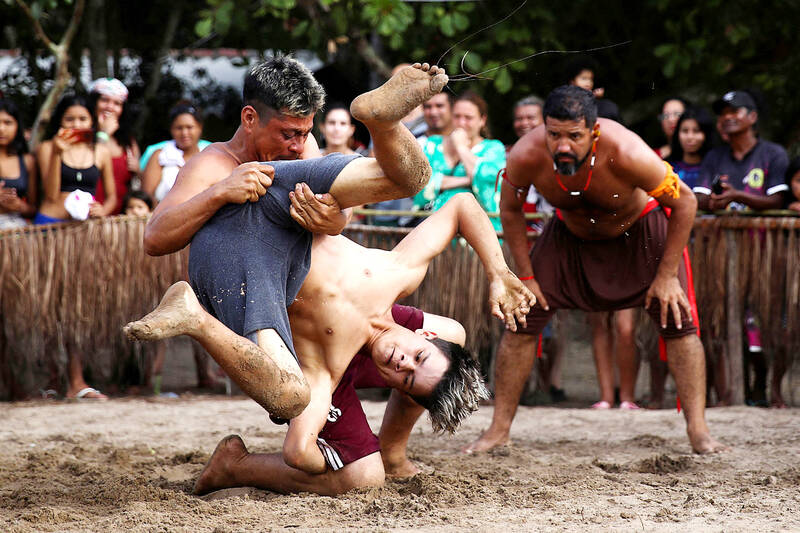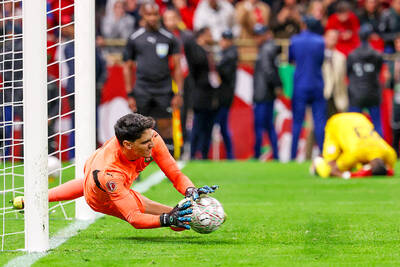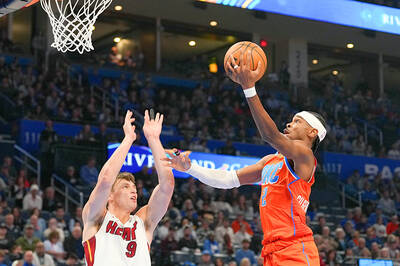As a bonfire lit by children finished burning, the winners at the first Indigenous Games of Peruibe calmly welcomed their wooden medals around their necks with little fanfare otherwise.
Yet the spectators screamed and howled around the village’s arena as defeated competitors applauded in between smoking their pipes.
The two-day competition last weekend in southern Sao Paulo state was not exactly the Olympics, but some of the friendly spirit of the past echoed among about 120 athletes of the Guarani, Tupi-Guarani and Fulnio ethnicities — plus 21 of their non-Indigenous friends allowed to compete on Piacaguera Indigenous land.

Photo: Reuters
The program was a mix of imports and local traditions: archery, tug of war, soccer, a Brazilian Indigenous wrestling named Uca-Uca, a log-carrying relay race on the beach, dart blowing and others. The spear and rock throwing competitions were suspended because of rainy weather, and there were not enough people to play in the Indigenous badminton category, so it was canceled.
The Indigenous peoples spread among 17 villages around Peruibe, a beachfront city 138km south of Sao Paulo, frequently hold their sporting events during other celebrations of their culture, but one year ahead of the Paris Olympics there is enough interest among youngsters for a solo sports competition, which elders hope will reinforce their heritage.
“We didn’t expect so many people here, among competitors and visitors,” chief Awa Tenondegua dos Santos said.
Wearing Paris Saint-Germain shorts and black paint on his body, he competed — and lost — in every sport he played during the games.
“This is more fun than anything else. We are not the Olympic Games, but we are a success, too,” he said.
Organizers say at least 500 people showed up for the event. Dozens chose to camp around the village from Friday to Sunday and live out in the open like the Indigenous.
April is Brazil’s Indigenous Awareness Month, an occasion that is once again widely celebrated under Brazilian President Luiz Inacio Lula da Silva. His predecessor, Jair Bolsonaro, was a critic of Indigenous celebrations.
Many Indigenous people in Brazil believe anyone above the age of 10 should be considered an adult, which sometimes puts strong contenders face-to-face with very young beginners.
In a grass skirt and a feathered headdress, teenager Suri Jara finished third in the women’s archery contest. Support from the people from her village, Tapirema, gave her an added boost.
“This is not a real competition, we are here to make friends, but it is nice to see I did well against them,” Jara said. “I don’t listen to people roaring like this every day. It felt special.”
Archery is a clear link between the Indigenous Games in Peruibe and the Olympics, which has had the sport on its program since the 1900 Paris Games.
The competitors in Brazil had to hit one out of three pieces of wood from about 20m. At the Olympics, archers shoot from at least 50m at a five-color target.
Soccer and tug of war, which was once an Olympic sport, are the two imports that the Indigenous love to play, but visitors were more interested in the typically local competitions.
The log-carrying relay race is popular among the Indigenous all over Brazil. Some of those races take place with logs that weigh about 100kg and with as many as 10 competitors in each team.
In Peruibe, the organization sliced logs from a kind of palm tree that was cut after rituals and gave them to four team’s of two per race. The heaviest of the pieces, used in the men’s tournament, weighed about 5kg. The lightest, for children, was one-tenth of that.
The pinnacle of the games for fans came on Sunday afternoon after the best warriors of the three groups — and some beginners, too — gathered for the grueling Uca-Uca wrestling competition. The rules for the brawl on the sand are simple: Fighters must make their rivals fall on their backs without using their legs, much like sumo. No breaks.
“That’s the traditional Uca-Uca, but we know some fighters have some jujutsu techniques up their sleeves,” said Guaciane da Silva Gomes, one of the leaders of the Tapirema village. “That is fine. We are here to show our culture, but we also embrace what is good in others. We are not here to impose, we just want to be seen and respected as we are.”
As soon as the Uca-Uca tournament was finished, the bonfire was put out. It is to be lit again at the same time next year, probably in another village close by, shortly before the Paris Olympics begin.

Manchester United on Tuesday confirmed Michael Carrick as interim manager until the end of the season, tasking him with leading the Red Devils back into the UEFA Champions League. “Having the responsibility to lead Manchester United is an honor,” said Carrick, 44, who won 12 major trophies in his 12-year playing career at United. The former midfielder previously had an unbeaten three-game stint as caretaker boss at Old Trafford in 2021. Carrick then took on his first permanent managerial role at second-tier Middlesbrough in October 2022 and was sacked in June last year after the club finished 10th in the

Dallas Mavericks rookie Cooper Flagg on Wednesday was ruled out for the second half of their 118-109 loss to the Denver Nuggets after the No. 1 pick sprained his left ankle in the first half. Flagg was called for a foul while defending against Peyton Watson and turned the ankle as he fell to the floor with 6 minutes, 1 second left in the second quarter. Flagg limped to the bench and continued to the locker room, but returned for the final 2 minutes, 35 seconds before the break. The 19-year-old did not come out for the second half before the announcement that

Yassine Bounou on Wednesday saved two penalties, while Youssef en-Nesyri netted the decisive spot-kick as hosts Morocco secured a 4-2 shoot-out victory over Nigeria following a 0-0 draw in a tense Africa Cup of Nations semi-final in Rabat. Morocco, seeking their first continental title in 50 years, are to face 2021 winners Senegal in Sunday’s decider in Rabat, while Nigeria take on Egypt in the third-place playoff tomorrow. The 120 minutes before the shoot-out had few clear-cut chances for either side, but it was Morocco who created more opportunities, although they were denied by some fine saves from Nigeria goalkeeper Stanley Nwabali. Nigeria

Reigning NBA Most Valuable Player Shai Gilgeous-Alexander on Sunday sparked defending champions Oklahoma City to victory, while Anthony Edwards led Minnesota’s last-minute fightback to beat San Antonio. Gilgeous-Alexander scored 29 points while adding eight assists and five rebounds in the Thunder’s 124-112 home victory over Miami, improving the NBA’s best record to 33-7 after outscoring the Heat 70-53 in the second half. “We locked in defensively. We were finally able to get some stops,” Thunder guard Aaron Wiggins said. “We were able to get out in transition a little bit, get going offensively and find the flow.” Jalen Williams scored 18 points, while